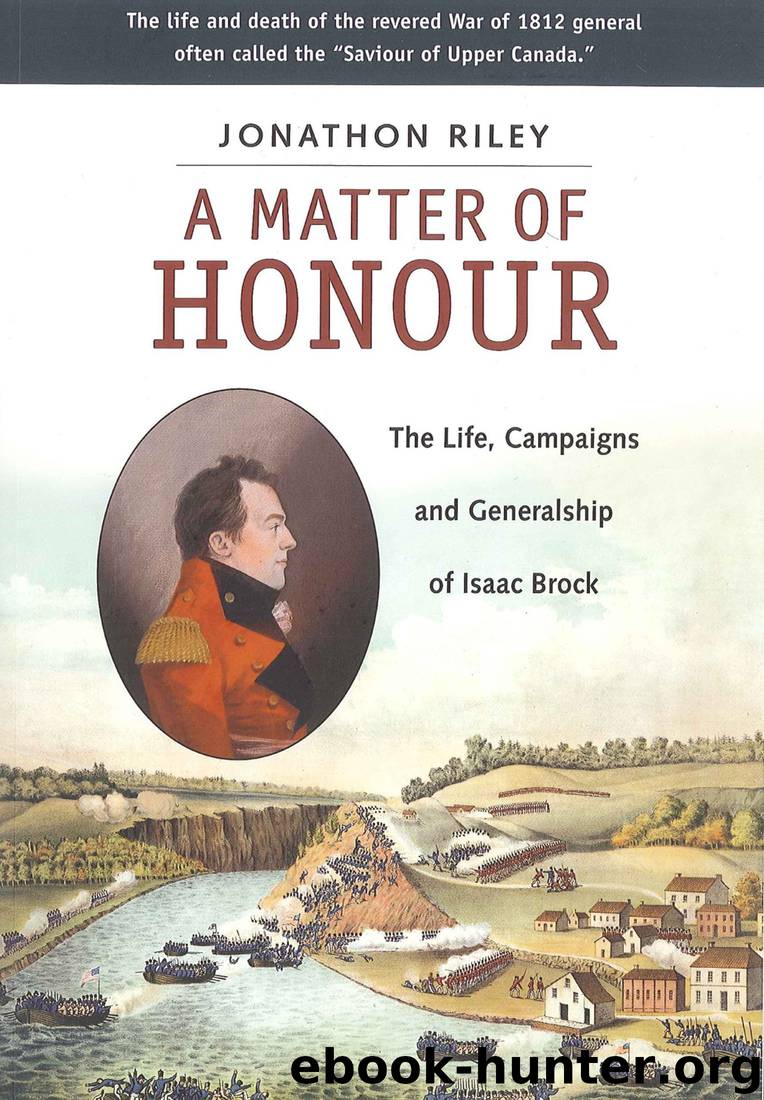A Matter of Honour: The Life, Campaigns and Generalship of Isaac Brock by Jonathon Riley

Author:Jonathon Riley [Riley, Jonathon]
Language: eng
Format: epub
Tags: War of 1812, Leaders, Campaigns & Battles, Biographies & Memoirs
ISBN: 9781896941653
Amazon: 1896941656
Publisher: Frontline Books
Published: 2011-05-15T08:00:00+00:00
Strategy is the achievement of national objectives using such ways and means as are available, appropriate and legal. Tactics is the business of fighting battles and engagements. Between the two lies the operational level of war, which modern doctrine describes as the vital link, or gearing, between military strategic objectives and the tactical employment of forces in battles and engagements. It is the level at which campaigns and major operations are planned, sustained, sequenced and directed. “It is,” says the British army’s doctrine publication Operations, “the responsibility of the operational level commander to determine the campaign plan required to achieve the desired military strategic end-state within the designated theatre of operations.” In this, it draws heavily on the writings of Brock’s contemporary theorists, Baron Antoine Jomini and General Karl-Maria von Clausewitz. Explicit in the design of a campaign is the defeat of an enemy, which is defined by the British army as so diminishing the effectiveness of the enemy that he is either unable to participate in combat or at least cannot fulfil his intentions. This is a notion that Brock and his contemporaries understood completely. It encapsulates both the physical destruction of an enemy’s ability to prosecute war and the destruction of his will to fight. The latter is often more efficient, if more indirect, for as Napoleon himself remarked, “More battles are decided by loss of hope, than by loss of blood.” Its ways are pre-emption, dislocation and disruption; its means include firepower, superior force ratios, superior tempo, simultaneous action and surprise.
The business of the operational level and its commander is campaigning. A campaign can be defined very simply as a set of military operations planned and conducted to achieve a strategic objective, within a given time and geographical area. Thus a campaign is set within the context of operational art: it is not just grand tactics, or strategy writ small. Clausewitz points out two key concepts for the operational general. First, the principle of culmination – that is, the point at which one side starts winning and the other starts losing, either offensively or defensively. Secondly, the notion of the decisive act, or the decisive operation, that which causes an enemy to culminate – that is, to be unable further to develop offensive operations and thus to surrender the initiative. War is seldom so straightforward as to permit of one single decisive act; usually what is decisive is a combination of several actions. But herein lies the very essence of generalship at the operational level: determining those things that are going to be decisive, and then bringing those circumstances to pass. Therefore sequencing events through a series of decisive points is a key part of planning, as is deciding on simultaneous actions and effects to overwhelm an enemy. Invariably, what is going to be decisive will have a direct relationship to the centre of gravity of an opponent, which must be attacked, and to one’s own, which must be protected from attack. By centre of gravity we
Download
This site does not store any files on its server. We only index and link to content provided by other sites. Please contact the content providers to delete copyright contents if any and email us, we'll remove relevant links or contents immediately.
| Africa | Americas |
| Arctic & Antarctica | Asia |
| Australia & Oceania | Europe |
| Middle East | Russia |
| United States | World |
| Ancient Civilizations | Military |
| Historical Study & Educational Resources |
Cat's cradle by Kurt Vonnegut(15338)
Pimp by Iceberg Slim(14488)
4 3 2 1: A Novel by Paul Auster(12377)
Underground: A Human History of the Worlds Beneath Our Feet by Will Hunt(12090)
The Radium Girls by Kate Moore(12018)
Wiseguy by Nicholas Pileggi(5770)
The Fire Next Time by James Baldwin(5431)
Perfect Rhythm by Jae(5398)
American History Stories, Volume III (Yesterday's Classics) by Pratt Mara L(5301)
Paper Towns by Green John(5179)
Pale Blue Dot by Carl Sagan(4996)
A Higher Loyalty: Truth, Lies, and Leadership by James Comey(4954)
The Mayflower and the Pilgrims' New World by Nathaniel Philbrick(4495)
The Doomsday Machine by Daniel Ellsberg(4484)
Killers of the Flower Moon: The Osage Murders and the Birth of the FBI by David Grann(4435)
The Sympathizer by Viet Thanh Nguyen(4385)
Too Much and Not the Mood by Durga Chew-Bose(4338)
The Borden Murders by Sarah Miller(4313)
Sticky Fingers by Joe Hagan(4188)
